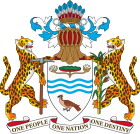
The politics of Guyana takes place in a framework of a representative democratic assembly-independent republic, whereby the President of Guyana is the head of government and of a multi-party system. Executive power is exercised by the President, advised by a cabinet. Legislative power is vested in both the President and the National Assembly of Guyana. The judiciary is independent of the executive and the legislature.
The history of Guyana begins about 35,000 years ago with the arrival of humans coming from Eurasia. These migrants became the Carib and Arawak tribes, who met Alonso de Ojeda's first expedition from Spain in 1499 at the Essequibo River. In the ensuing colonial era, Guyana's government was defined by the successive policies of Spanish, French, Dutch, and British settlers. During the colonial period, Guyana's economy was focused on plantation agriculture, which initially depended on slave labor. Guyana saw major slave rebellions in 1763 and 1823. Following the Slavery Abolition Act of 1833, 800,000 enslaved Africans in the Caribbean and South Africa were freed, resulting in plantations contracting indentured workers, mainly from India. Eventually, these Indians joined forces with Afro-Guyanese descendants of slaves to demand equal rights in government and society. After the Second World War, the British Empire pursued policy decolonization of its overseas territories, with independence granted to British Guiana on May 26, 1966. Following independence, Forbes Burnham of the rose to power, quickly becoming an authoritarian leader, pledging to bring socialism to Guyana. His power began to weaken following international attention brought to Guyana in wake of the Jonestown mass murder suicide in 1978.

British Guiana was a British colony, part of the mainland British West Indies, which resides on the northern coast of South America. Since 1966 it has been known as the independent nation of Guyana.

Cheddi Berret Jagan was a Guyanese politician and dentist who was first elected Chief Minister in 1953 and later Premier of British Guiana from 1961 to 1964. He later served as President of Guyana from 1992 to his death in 1997. In 1953, he became the first person of Indian descent to be a head of government outside of the Indian subcontinent.
Brindley Horatio Benn, CCH was a teacher, choirmaster, politician, and one of the key leaders of the Guyanese independence movement. He was put under restriction when the constitution was suspended in 1953. In 1957, Benn served as Minister of Community Development and Education in the first elected government of Guyana, and between 1961 and 1964 as Minister of Natural Resources. From 1993 to 1998, he served as High Commissioner of Guyana to Canada.

Janet Rosenberg Jagan was an American-born Guyanese politician who served as the President of Guyana, serving from December 19, 1997, to August 11, 1999. She was the first female president of Guyana. She previously served as the first female Prime Minister of Guyana from March 17, 1997, to December 19, 1997. The wife of Cheddi Jagan, whom she succeeded as president, she was awarded Guyana's highest national award, the Order of Excellence, in 1993, and the UNESCO Mahatma Gandhi Gold Medal for Women's Rights in 1998.

Linden Forbes Sampson Burnham was a Guyanese politician and the leader of the Co-operative Republic of Guyana from 1964 until his death in 1985. He served as Premier of British Guiana from 1964 to 1966, Prime Minister of Guyana from 1964 to 1980 and then as the first Executive President of Guyana from 1980 to 1985. He is often regarded as a strongman who embraced his own version of socialism.

Elections in Guyana take place within the framework of a multi-party representative democracy and a presidential system. The National Assembly is directly elected, with the nominee of the party or alliance that receives the most votes becoming President.

The People's Progressive Party/Civic (PPP/C) is a major political party in Guyana. As of 2020, the party holds 33 of the 65 seats in the National Assembly and forms the government. It has been the ruling party in the past as well, most recently between 1992 and 2015. In Guyana's ethnically divided political landscape, the PPP/C is a multi-ethnic organization that is supported primarily by Indo-Guyanese people.

The Constitution of Guyana is the highest governing document in the Republic of Guyana. It came into effect on October 6, 1980, replacing the constitution enacted in 1966 upon its independence from the United Kingdom. The current Constitution of Guyana contains 12 chapters that are further divided into 232 articles. It also contains a preamble and an oath. Since its 1980 enactment, it has gone through multiple amendments.

General elections were held in British Guiana on 21 August 1961. The result was a victory for the People's Progressive Party, which won 20 of the 35 seats.
The Progressive Youth Organisation of Guyana is a youth organisation in Guyana, the youth wing of the People's Progressive Party. The membership of Progressive Youth Organisation (PYO) is predominantly Indo-Guyanese, like its mother party.

The National Labour Front (NLF) was a political party in Guyana.

General elections were held in British Guiana in 1916.

The House of Assembly was the legislature of British Guiana in the 1950s and 1960s.

The National Democratic Party (NDP) was a political party in British Guiana led by Rudy Kendall.

The Manpower Citizens' Association was a trade union and political party in British Guiana.

The Political Affairs Committee (PAC) was a political party in British Guiana.

Jane Phillips-GayCCH was an Afro-Guyanese trade unionist and an ordained minister. She was an advocate of women's rights, formed one of the first women's political organizations in the country and served as one of the first women to be elected as a Member of British Guiana Parliament. She was recognized with the national service honor, the Cacique Crown of Honor in 1975.
Jessie Irma Sampson Burnham was a Guyanese educator and politician. In 1953 she was elected to the House of Assembly alongside Janet Jagan and Jane Phillips-Gay, becoming its first female members.









